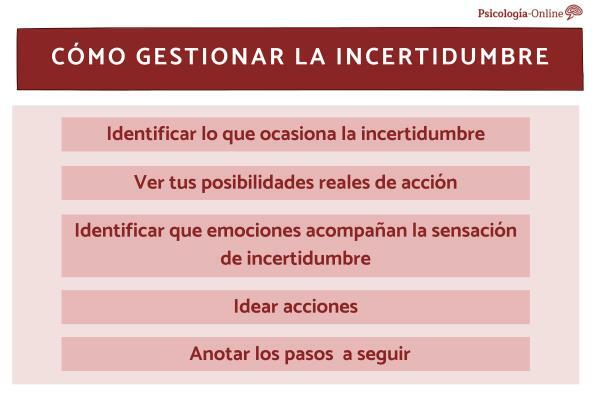
The current COVID-19 health emergency is undeniably favoring the consolidation of the pervasive and lasting uncertainty. A situation we are experiencing that can make us feel overwhelmed. Too much information from too many sources, often contradictory, and usually not very encouraging, can literally put calls into question our normal ability to assess and manage what surrounds us, even small things can become very big.
It may happen that we have difficulties understanding them, a bit like it happens after a night out. This happens because we are living in a very special period for which there are no tutorials or clear instructions, where we must give ourselves the possibility of making mistakes or of not being immediately prepared to act with our typical certainties. Therefore, in this Psychology-Online article, we are going to try to approach the subject by suggesting some tips on how to manage uncertainty.
Index
- What is uncertainty
- Why do we feel the uncertainty
- Effects of uncertainty
- How to work on tolerance to uncertainty
What is uncertainty.
Uncertainty in psychology is the lack of information regarding external events to ourselves. It has to do with a state of mind where it is difficult to properly categorize or structure what happens to us.
It is human nature to feel uncomfortable when we do not know what is going to happen. For our first ancestors, uncertainty meant danger and it had to be avoided at all costs. For example, if a cave is too dark and there is a danger that a hungry saber-toothed tiger may be lurking inside, better stay away.
Our instinct to avoid the unknown runs so deep that we prefer to suffer for something we know than experiencing the proverbial leap into the void. For example, in an English study people felt less stressed when they knew they would receive a painful electric shock than when the chance of receiving an electric shock was 50 and 50.
Why do we feel the uncertainty.
The human mind uses a set of patterns learned from experience or innate to process representations of the events it is about to face. Uncertainty appears as an attempt to predict what will happen to achieve a better adaptation to the environment. By reducing unpredictability factors, the individual has the feeling that they can make more efficient use of their resources.
A known development situation allows the subject to focus more on the external environment that in his own activity of thought; which presents a high quota of uncertainty. For example, an unprecedented task or meeting new people can activate an anxious thought that distorts the real content of the experience.
An uncertain event is by definition unpredictable, that is, it could be negative, positive or neutral. In most cases, there are no objective reasons to make a negative prediction, as no prediction is truly reliable until it occurs.
Effects of uncertainty.
According to Howard Phillips Lovecraft, the oldest and strongest human emotion is the fear, and the oldest and strongest type of fear is the fear of the unknown.
Clinical practice and scientific evidence published in the last thirty years support this view, documenting that fear of the unknown, also called intolerance of uncertainty, represents an important factor of vulnerability involved in the development of psychopathology. Thus, the fear of uncertainty can cause the following effects:
- Anxiety.
- Tense relationships.
- Bad mood. In this article, we tell you how to lift your spirits.
- Increased sense of threat.
How to work tolerance to uncertainty.
Uncertainty can be taken as a risk, but also as an opportunity. It all depends on the
meaning that we attribute to it. We can use uncertainty as a motivation to take actions that can reduce this state. Let's see how to work on tolerance to uncertainty:
- Identify what causes the uncertainty: the first thing to do to manage uncertainty is to analyze the cause of it. For example, not knowing when face-to-face classes will return.
- See your real possibilities of action: For example, I will not be able to speak with the minister, but maybe I can act in some way that helps me to have some certainties.
- Identify which emotions accompany the feeling of uncertainty: these can be of great variety. Being aware of them helps you manage uncertainty and better choose the action you want to take. It is not the same to move from anger than from grief. In this article, we tell you how to manage anger.
- Devise actions: There are many ways to act that help increase certainty. This depends on each one and on his own discomfort. For example, one action might be to move forward with academic homework.
- Write down the steps to follow in a notebook: the goal is to understand things from another point of view. It is very important to try to be as realistic as possible and avoid using words that make the situation bigger or smaller. So you have to try to avoid words like the following: always, never, never, all the time, etc.
Uncertainty is always present and in any circumstance, therefore, it also depends on us to find spaces of certainty and thus achieve more tranquility.
This article is merely informative, in Psychology-Online we do not have the power to make a diagnosis or recommend a treatment. We invite you to go to a psychologist to treat your particular case.
If you want to read more articles similar to How to manage uncertainty, we recommend that you enter our category of Emotions.
Bibliography
- Bottesi, G. (2020). Incertezza, intolleranza all’incertezza and psychological distress in the response of the health emergency COVID-19. Recovered from: https://www.apertamenteweb.com/incertezza-intolleranza-allincertezza-e-distress-psicologico-nel-contesto-di-emergenza-sanitaria-covid-19-di-gioia-bottesi/
- LMRP Psychology Team (2020). Uncertainty from psychology. Recovered from: https://www.secst.cl/upfiles/documentos/27062020_411pm_5ef7c4056c6ca.pdf
- Frazzoni, G. (2013). Il timore dell’incertezza. Recovered from: https://www.psicoterapiaemilano.it/psicologomilano/il-timore-dellincertezza/


